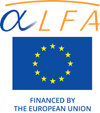Scope of Action
Below is a description of a common problematic, which exists in higher education for people with disability from LA:
P1. Curriculum developments in LA, in general, are not designed for its complete follow-up by students with disability, and do not comply with accessibility standards of the contents, especially in the case of virtual programs taught through virtual campuses.
P2. There are a reduced number of people with disability studying in HEI from LA. For example, in Paraguay, with a disability rate between 12% and 20% of the total population, and illiteracy rate of 43%, of the 57% of people with disability that has gotten into school, only 2% has received higher education. In Uruguay exists 1,5% of people with disability that receive higher education.
P3. There are shortages in the education of the academic staff in LA about quality accessible virtual education techniques, which is why it is necessary to update their specific knowledge.
P4. The specific programs and models of evaluation of quality and accessibility of the teaching in higher education in LA are few and limited and that is why it is really difficult to identify the problems and propose solution alternatives. Moreover, said programs are, in general, inexistent when it is about online educational programs.
P5. Academic failure, access and permanency difficulty, of students with disability in vulnerable areas, especially in countries like Ecuador, El Salvador, Guatemala, Paraguay and Peru. Lack of knowledge in basic sciences, makes it difficult, maybe even impossible, for students in these areas and in the indigenous communities to access university studies. Most universities do not count on escort measures for students with disability. Another problem is in the difficulty for transportation in rural areas far from urban centers, which makes mobility difficult for young people with disability from vulnerable communities,
ESVI-AL project gives an answer to the needs and limitations described in the previous paragraph (numeration of the proposed solutions corresponds with stated problems):
S1. Analyze the experiences in development processes of the study plans and proposes improvements in the pertinence of those. In the analysis will also be included previous experiences from other universities that have studied the problem. For that there will be generated, at least, three study plans conceptualized according to the social and professional needs of people with physical disabilities, and the first edition will be implemented in 4 universities, as a pilot experience.
S3. Train the academic staff from participant LA universities. For that there will be seminars or workshops implemented, among participant universities, of specialization courses in accessible contents. It is about a process of multilateral knowledge transfer, based on mobility actions combined with distance education or blended learning, to give more possibilities to the budgeted encounters.
S4. Integrate evaluation programs and improvement in the quality of online educational actions. It is based on the experience of the partners in the creation and implementation of these plans according to accepted standards in their respective countries. ESVI-AL project broadens these accreditation programs to consider the accessibility case and the virtual education; and adapts and accommodates these standards to also evaluate the accessibility and each member country and institution in LA with the objective of implementing continuing plans.
S5. Contribute with a proposals package to introduce reforms at the institutional level. Between these proposals it would be: the implementation of leveling courses in ICT or digital alphabetization for people with disability, and seminars of orientation of studies. Leveling courses in ICT gives the student with disability a basic education through updating and reviewing basic concepts. The orientation of studies and labor seminars, give an answer on to what to study and which is going to be the professional projection. Access is facilitated, adapting the entrance normative, which will pay attention to the criteria of positive discrimination and to young people with disability from underprivileged rural areas. The academic staff and the means of the different partners will be analyzed with the purpose of facilitating young people the development of their vocation, abilities and work expectations.
The project is shaped, therefore, in relation to two central points. On the one hand, the institutional and academic management, every time that it proposes a review of experiences of the improvement processes of the study plans of the programs from participant universities. On the other hand, social cohesion, because ESVI-AL project proposes the exchange and systematization of experiences that permit university programs to project to society and copy said experiences to the curriculum development of accessible virtual study programs.






